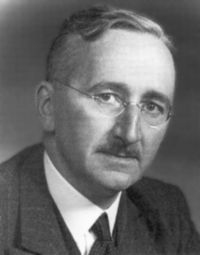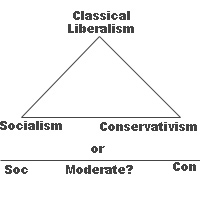
(New section: What's New!)
Essays: A New Political Paradigm
This site is in tribute to one of the greatest and least appreciated minds of the 20th century. I am not an economist and, before learning of Hayek, had no interest in economics. My passion has been the study of Liberty and Democracy; little did I know that an economist would be my greatest teacher.
"Mankind has a great aversion to intellectual labor; but even supposing knowledge to be easily attainable, more people would be content to be ignorant than would take even a little trouble to acquire it." - Samuel Johnson (1709 - 1784), quoted in Boswell's Life of Johnson
![]()
From Hayek's inaugural address upon becoming a professor at the London School of Economics in 1931 he declared that it was "almost inevitable" that any "warmhearted person, as soon as he becomes conscious of the existing misery, should become a socialist." But economic study would bring that person to a more conservative point of view. This would happen to people who "have all possible sympathy with the ethical motives" from which radicalism springs and who "would be only too glad if they could believe that socialism or planning can do what they promise to do." (Friedrich von Hayek profile from PBS's excellent series, "The Commanding Heights")
![]()
But the essence of Liberty began long before.
In the Daodejing, written more than 2,000 years before Adam Smith's Wealth of Nations, Lao Tzu instructed the sage (ruler) to adopt the principle of noninterference as the best way to achieve happiness and prosperity:
Administer the empire by
engaging in no activity.
The more taboos and prohibitions there are in the world,
The poorer the people will be.
The more laws and orders are made prominent,
The more thieves and robbers there will be.
Therefore, the sage says, take no action and the people of themselves
are transformed.
I engage in no activity and the people of themselves become
prosperous. (http://www.freetrade.org/pubs/articles/jd-7-14-99.html)
Though, do not get the misimpression that this necessarily refers to anarchy or any of the trendy Libertarian variants, i.e.. "anarcho-capitalism", "minarchism", etc. Hayek fully understood the role LIMITED government and The Rule of Law must play in any civilized society.
![]()
In these pages I hope to add in some small way to spreading the principles Hayek contributed to our understanding of Liberty and the possibilities for a socio-political system that would work better than any that has gone before - the way our Founding Fathers intended.
I feel strongly that one of the most fatal flaws we Americans are experiencing is the polarization of our two-party system and the confusion of the "center". Why else would half of registered voters not even bother to vote? Apathy and revulsion has been festering and most of us that do bother to vote, often choose the least detestable candidate.
Hayek went into great detail
on the subject in his essay "Why
I am not a Conservative".
The essential flaw that has evolved is due to looking at the political spectrum
in a linear fashion, with the Democrats (representing classical Socialist views)
on the Left, Republicans (representing classical Conservative views) on the
Right, and every other group in the middle arrayed and judged by how far Left or
Right they are.
What is lacking in this system is a clear third axis representing Classical Liberal (libertarian) views. For clarification, the understanding of Liberalism has been corrupted by the Socialists to describe their position behind total government regulation, subsidy, and control in the name of "equality". In every other country Liberalism has historically represented the position supporting limited government, the Rule of Law, and individual Liberty (hence Liber-alism). And to round out our triumvirate, Conservativism has traditionally represented the forces resisting change and supporting "moral" authoritarian control.
Democracy extends the sphere of individual freedom, socialism restricts it. Democracy attaches all possible value to each man; socialism makes each man a mere agent, a mere number. Democracy and socialism have nothing in common but one word: equality. But notice the difference: while democracy seeks equality in liberty, socialism seeks equality in restraint and servitude. – Alexis de Toqueville
In our current system, those who do not agree with either the Democratic or Conservative agenda must choose between the two because there is currently no viable alternative. Furthermore the "moderate" Conservatives and Socialists use the same words denouncing big government and advocating individual Liberty but both rigorously pursue more governmental regulation and bureaucracy, inevitably leading toward totalitarianism because that is really the only choice.
"At all times sincere friends of freedom have been rare, and its triumphs have been due to minorities, that have prevailed by associating themselves with auxiliaries whose objects often differed from their own; and this association, which is always dangerous, has sometimes been disastrous, by giving to opponents just grounds of opposition." - Lord Acton
"A society that does not recognize that each individual has values of his own which he is entitled to follow can have no respect for the dignity of the individual and cannot really know freedom." F. A. von Hayek.
